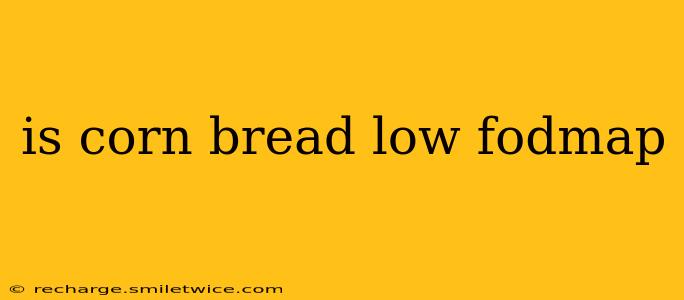Is Cornbread Low FODMAP? A Comprehensive Guide
Cornbread, a staple in many cuisines, often sparks questions among those following the low FODMAP diet. The answer isn't a simple yes or no, as it depends on the recipe and the serving size. Let's delve into the complexities of cornbread and its suitability for a low FODMAP lifestyle.
Understanding FODMAPs
Before we explore cornbread specifically, let's briefly revisit FODMAPs (Fermentable Oligosaccharides, Disaccharides, Monosaccharides, and Polyols). These are short-chain carbohydrates that can trigger digestive distress in individuals with Irritable Bowel Syndrome (IBS). The low FODMAP diet involves temporarily eliminating high-FODMAP foods to identify triggers and then gradually reintroducing them to determine individual tolerances.
The FODMAP Content of Cornbread Ingredients
Cornbread's FODMAP content largely hinges on its ingredients. Let's examine the key components:
-
Cornmeal: Cornmeal itself is generally considered low FODMAP in moderate portions. However, the type of cornmeal can influence its FODMAP content. For example, some cornmeal may contain higher levels of fructans depending on processing methods.
-
Dairy Products (Milk, Buttermilk): Milk and buttermilk are moderate to high FODMAP foods, primarily due to lactose. If your cornbread recipe includes dairy, it significantly raises the FODMAP content. Using lactose-free alternatives can help.
-
Wheat: Some cornbread recipes incorporate wheat flour, either alone or in combination with cornmeal. Wheat is high in fructans, a type of FODMAP, and thus should be avoided on a low FODMAP diet. Always check the ingredients list carefully!
-
Other Ingredients: Other ingredients, like onions, garlic, and certain sweeteners, can also impact the overall FODMAP load. These additions dramatically increase the FODMAP count depending on the quantity.
Is Cornbread Suitable for Low FODMAP Diets?
The answer is nuanced. A simple cornbread recipe using only cornmeal, eggs, a small amount of oil, and a low FODMAP sweetener (such as maple syrup or a small amount of honey) could be considered low FODMAP in a small portion. However, many cornbread recipes include high-FODMAP ingredients, making them unsuitable for those following the low FODMAP diet.
Frequently Asked Questions (FAQs):
Q: Can I eat cornbread on a low FODMAP diet?
A: It depends on the recipe and portion size. Simple cornbread made with only low-FODMAP ingredients in a small serving might be tolerated. However, many recipes contain high-FODMAP ingredients like dairy or wheat, rendering them unsuitable.
Q: What are some low FODMAP alternatives to cornbread?
A: Consider exploring other low-FODMAP bread options. These can include gluten-free breads made with low-FODMAP starches and flours, checking their ingredient labels carefully. Always choose reputable brands that clearly label FODMAP content.
Q: How much cornbread is considered a low-FODMAP serving?
A: There isn't a universally agreed-upon serving size. A good starting point is a very small portion (approximately 1/4-1/2 cup) of cornbread made with only low-FODMAP ingredients. Always monitor your body's response to determine your tolerance.
Q: Are there any cornbread recipes specifically designed for the low FODMAP diet?
A: You can find recipes online that claim to be low FODMAP; however, always double-check the ingredients list to verify that all elements are low in FODMAPs. Remember that even small amounts of high-FODMAP ingredients can impact your digestion.
Q: What makes cornbread high or low FODMAP?
A: The presence of high-FODMAP ingredients like dairy, wheat, onions, garlic, and high fructose corn syrup dictate whether a cornbread recipe is high or low FODMAP.
Conclusion:
While a simple, minimally-processed cornbread might be low FODMAP in small portions, it's crucial to carefully examine each ingredient list. If unsure, err on the side of caution and opt for proven low-FODMAP alternatives. Always consult with a registered dietitian or healthcare professional specializing in IBS to personalize your dietary approach. They can provide guidance on appropriate serving sizes and suitable substitutes based on your individual needs and tolerances.
